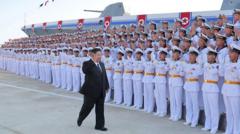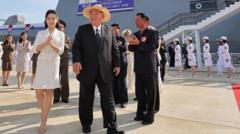In a stunning turn of events, North Korea's latest attempt to launch its second navy destroyer failed catastrophically, prompting an enraged response from Kim Jong-un. Observing the launch from Chongjin on Wednesday, Kim witnessed the 5,000-ton vessel topple as its stern slid down the ramp while the bow remained stuck, resulting in damage to the hull and leaving the ship precariously on its side in the water.
Kim Jong-un's Outrage Over Failed Destroyer Launch: A Lesson in Accountability

Kim Jong-un's Outrage Over Failed Destroyer Launch: A Lesson in Accountability
North Korea's supreme leader expresses fury over a botched naval project, pledging severe consequences for those involved in the mishap.
While details remain sparse, with no images or reports of injuries released by North Korea, South Korean military analysts confirmed the ship's unfortunate position after observing satellite imagery. The incident paints a troubling picture for Kim, who has been vocal about North Korea’s military advancements, including the modernization of its naval fleet, which has predominantly relied on aging Soviet-era ships.
Describing the incident as a “serious accident,” Kim characterized it as a “criminal act,” rooted in negligence and “unscientific empiricism.” The state news agency reported that he held senior officials responsible for this failure, which he claims diminished the country’s dignity and respect. Consequently, he warned that the responsible parties would face repercussions in the upcoming Workers’ Party meeting, scheduled for next month.
In a bid to salvage the situation, Kim has demanded that the destroyer be repaired by that same gathering, emphasizing the incident as a political issue that directly impacts the state’s prestige. The mishap not only highlights the challenges North Korea faces in its military ambitions but also underscores the intense scrutiny and pressure under which Kim leads the nation. As the world watches, the outcome of this incident may redefine the internal dynamics of power within the ruling apparatus of North Korea.
Describing the incident as a “serious accident,” Kim characterized it as a “criminal act,” rooted in negligence and “unscientific empiricism.” The state news agency reported that he held senior officials responsible for this failure, which he claims diminished the country’s dignity and respect. Consequently, he warned that the responsible parties would face repercussions in the upcoming Workers’ Party meeting, scheduled for next month.
In a bid to salvage the situation, Kim has demanded that the destroyer be repaired by that same gathering, emphasizing the incident as a political issue that directly impacts the state’s prestige. The mishap not only highlights the challenges North Korea faces in its military ambitions but also underscores the intense scrutiny and pressure under which Kim leads the nation. As the world watches, the outcome of this incident may redefine the internal dynamics of power within the ruling apparatus of North Korea.


















